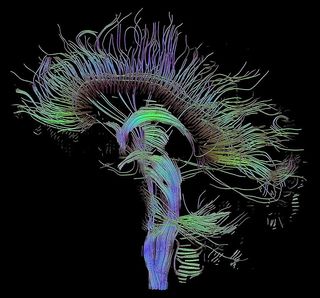
No, but the right thoughts influence whether you lose weight. It took me a long time to learn this because for a lot of my adult life I was a competitive rower. This involved training 2 or 3 times per day and burning a lot of calories—over 4000/day. I stuffed myself with lots of food. All kinds of food, including healthy stuff like salad and also less healthy stuff like pizza and chocolate cake. For normal amounts of exercise it’s true that you can’t outrun a bad diet, but I was doing more than normal, and I burned it all off.
You can't outrun a bad diet
When I retired from rowing I thought a bit about diet because some of my friends who retired got fat. I continued training and watched what I ate a bit. Thankfully, I’d learned healthy eating habits from my Mom, who was an amazing cook, so remained and prided myself on being lean and generally healthy.
That all changed when my wife was pregnant two years ago. For 3 months, she was nauseous and wouldn’t finish the food on her plate. I’d been trained as a child to finish what was in front of me, and I don’t like the idea of wasting food. So, after eating all my food, I would eat what she had left. Repeat for three months, and the result was predictable: I gained 5kg (12 lbs). That was 6% of my bodyweight, and my ‘body mass index’ (or BMI) increased to 27, which is considered overweight. It affected me. I couldn’t do some of my favourite yoga poses without feeling my belly squishing into me. Walking up flights of stairs puffed me out more easily, and I felt lethargic.
Walking up flights of stairs puffed me out more easily, and I felt lethargic.

Before reading any further, this blog is about the many of us who are or who have struggled with losing excess weight. Some people don’t eat enough and are underweight—if you are one of them, this doesn’t apply to you, please seek help.
At first, I thought it would be easy to burn the extra fat. After all, I was a disciplined athlete, and am a disciplined scholar. But the extra 5 kilograms was a tough opponent. I tried weighing myself every day, saying no to junk food and tracking my calories. I flirted with a ketogenic diet. All those things would start well, then I would fall off the wagon, binge, and get right up to where I started. I even tried a 10-day fast where I consumed nothing but water. I lost the weight but then binged on all the foods I had been dreaming of while fasting. Two years went by and I had little success.
My light bulb moment was when I started fasting on the (wrong) thoughts about food.
My light bulb moment was when I started fasting on the (wrong) thoughts about food. Instead of fighting the action of getting the chocolate cake, I would consciously direct my attention to something else, like the more lasting pleasure I feel from losing the additional weight. Instead of acting on the feeling of hunger by grabbing some grub, I would think to myself, ‘the feeling of an empty stomach is good, it makes me feel light’.
The fact that thoughts were important shouldn’t have surprised me, since I do mind/body research. Also, it's common sense that we need positive thoughts to begin the challenging task of returning to or maintaining a healthy weight. To prove this, imagine the opposite—imagine you had the negative belief that you just can’t change. Some people, like those with severe genetic conditions, really can’t change. But the vast majority of us are capable of modifying our thoughts and behaviours, at least to some degree. If you start off with that negative thought, you won't bother to even start on the path towards a healthy weight.
More generally, thoughts or desired precede actions (philosophical caveats notwithstanding). The thought of walking on the moon arose before anyone actually did it, and the thought or desire of eating chocolate cake arose before I did it. Even the thought of fasting on (wrong) thoughts of food occurred before I started fasting on them. So, in a sense, addressing thoughts around losing weight is primary.
As illuminating as it was to me, the idea that thoughts affect whether we lose unnecessary weight has been around for a long time. Psychological therapies like cognitive behavioural therapy, hypnosis, and mindfulness show promising effects for achieving weight loss. Going back even further, fasting from food includes a spiritual dimension that involves fasting from wrong thoughts in Hinduism, Christianity, Islam, and Judaism.

So, it’s not new that thoughts help lose weight. What is new, is that it’s become more important. A quarter to a third of people in the United States, United Kingdom, France, Canada, and many other countries are obese. Latest research shows that obesity is poised to overtake smoking as a preventable cause of cancer in the United Kingdom and United States. Obesity has even been called the ‘World’s Public Enemy Number 1’.
...the journey towards healthy weight begins with the right thought and staying on the right path depends partly on avoiding wrong thoughts.
To be sure, we need more than just the right thoughts to lose weight. We also need knowledge of nutrition and exercise. However, the journey towards healthy weight begins with the right thought and staying on the right path depends partly on avoiding wrong thoughts.
References
Madigan CD, Hill AJ, Hendy C, Burk J, Caterson ID. ‘Say no’: a feasibility trial of a brief intervention to reduce instances of indulgent energy‐intake episodes. https://doi.org/10.1111/cob.122
Lawlor ER, Islam N, Griffin SJ, et alThird-wave cognitive behaviour therapies for weight management: systematic review and network meta-analysis protocol BMJ Open 2018;8:e023425. doi: 10.1136/bmjopen-2018-023425



